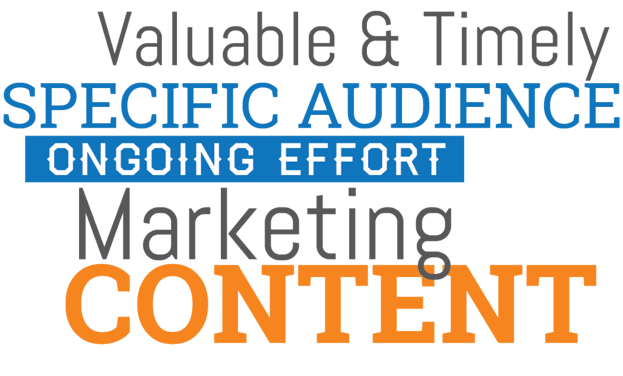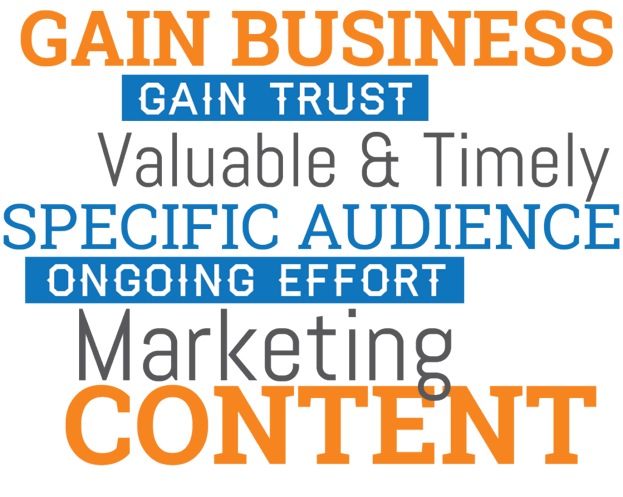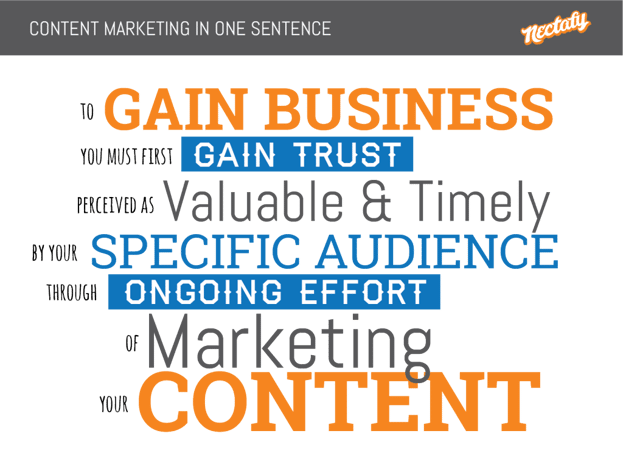What Is Content Marketing? You're Thinking Of It Backwards



You hear about content marketing and how all the cool kids are doing it, but what is content marketing, really?
If you were to try to create a simple definition of content marketing, you might end up with something like this:
Content marketing is the ongoing effort of publishing content that your specific audience finds valuable and timely in order to gain their trust, and eventually their business.
And, that's not bad. All the elements are there. I think that they're just completely backwards.
http://www.youtube.com/watch?v=cTtThLnoGnc
So, let’s break our definition down into little tasty morsels, and as we go, let's put the pieces in the right order.
Content
Content refers to the “stuff” you are creating that finds its way into your customer’s path. Content is the copy on your website, the blog posts you write, the videos you create, the emails you send, the publications you print, and the tweets, posts, and the like that you’re planting across the social landscape. It's the foundation of your content marketing efforts.

Marketing
Marketing helps introduce your specific audience to the solution that you provide, precisely because your solution meets their need.
Content marketing is marketing without overt selling. Notice I said, “overt,” not just because that’s a fun word to say, but because if you’re not selling, you’re not marketing. It’s just how you go about selling. By consistently teaching, entertaining, and otherwise doing good things for your target consumer, you’re developing loyalty. That loyalty, if nurtured and developed, turns into a commitment to your service or product. (By the way, the approach to selling is one of a few fundamental differences between content marketing and it’s edgier cousin, inbound marketing. But let's stay focused on content marketing for this post.)

Ongoing Effort
Content marketing is not merely churning out a large volume of material and hoping that something “sticks” with your target audience. To be effective, there must be a framework—a guiding plan—to make sure that you’re talking to the right people with information that they are excited about. And then it requires a consistent, patient approach to applying common sense techniques over and over. It's not glamorous, but it is effective.

Specific Audience
There are a bajillion (not a real number) phrases that describe this, but the key is to identify the most likely clients for your company, and then to zoom in tightly on meeting their needs through your content. The more narrow your focus, the more effective your content marketing will be.

Valuable & Timely
The words “valuable” and “timely" are especially critical to distinguish content marketing from the traditional method of interruption marketing. Traditional marketing annoys people. They feel interrupted because they don’t find an advertisement valuable. Or if they do, they don't want it right then.
Content marketing is built on the principle that you should stop interrupting people to get their attention. (Think "stupid car commercial" in the middle of the Patriots game. Although, in the case of the AFC Championship game, the commercials were actually way more valuable than the game. But I digress...) Start getting their attention by providing help on their terms.
When it comes to content, then, it’s all about meeting the perceived needs of your target audience. You must answer the question, "What does my target audience need and when is it important to them?"
It's that perfect intersection of the right stuff, at the right place, at the right time.

Gain Trust
When done well, content marketing helps your target audience trust you as someone who is on their side—someone that is genuinely looking out for their best interest. Of course, if you’re not on the side of your customer, you’ve got bigger problems than a little ol’ content marketing agency like Nectafy can solve. In fact, if you attempt to “change the perception” of your customers through content marketing, and you don’t genuinely care about your customers, you’ll actually accelerate your own demise. So, use content marketing with care.

Gain Business
The goal of your marketing is to generate more business. Period. Content marketing builds on the credibility and value that you’ve created. When the customer is ready to make their decision, their confidence in you results in new business. That's what makes this entire content marketing process worthwhile. So, let's put what's important at the top of our list.

The Beautiful Reversal
We usually define content marketing by starting with the content and working toward the end result. But, as a marketer, you need to start with the end result first: gaining business.
So, let's add in a few little helper words and define content marketing in reverse. Here's the grand reveal... (drum roll)...

If you found this "reverse" definition helpful, would you share it on LinkedIn, Twitter, or Google+?
And, I'd love to hear your take on content marketing down in the comments. What would you agree/disagree with?

